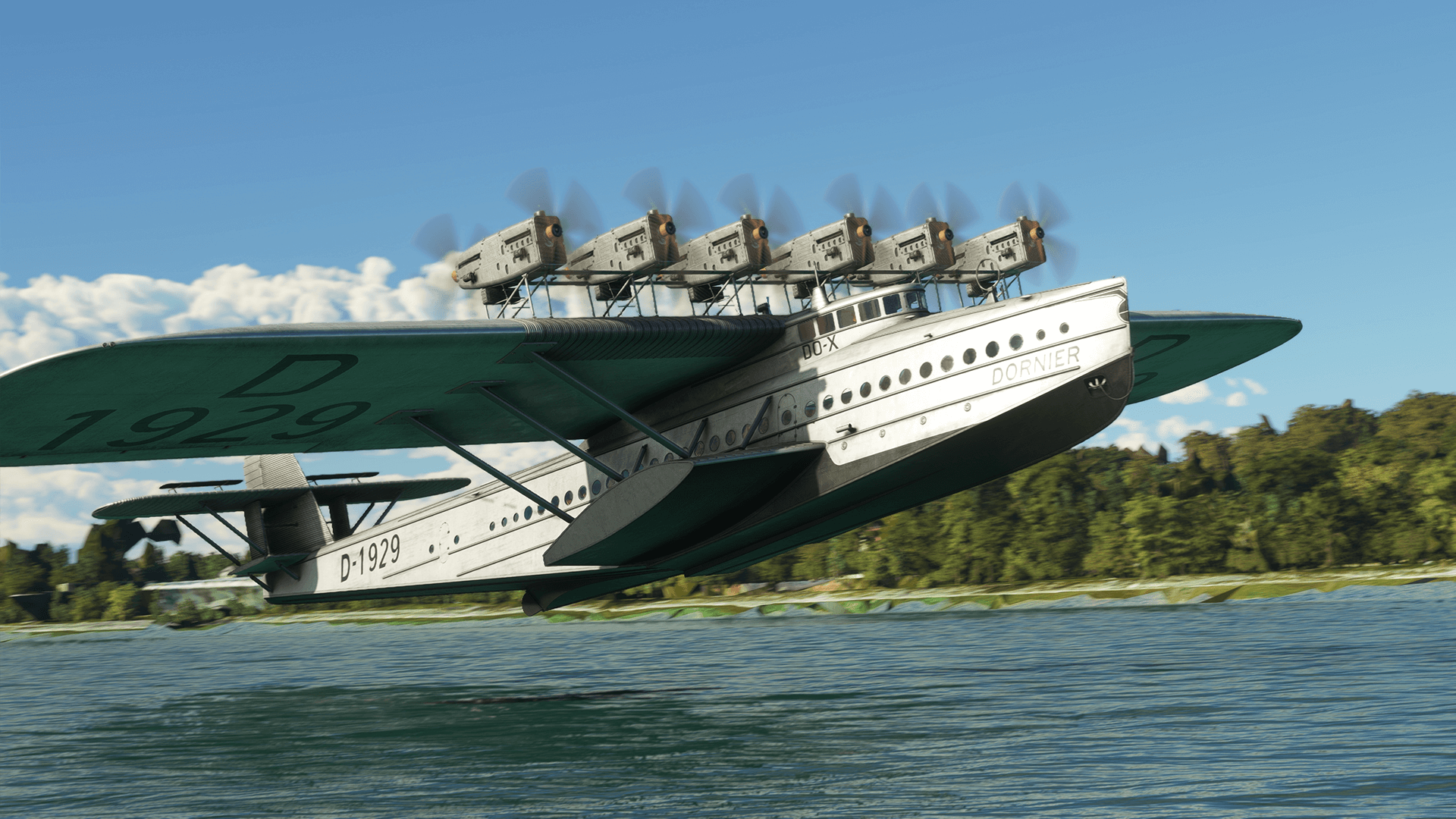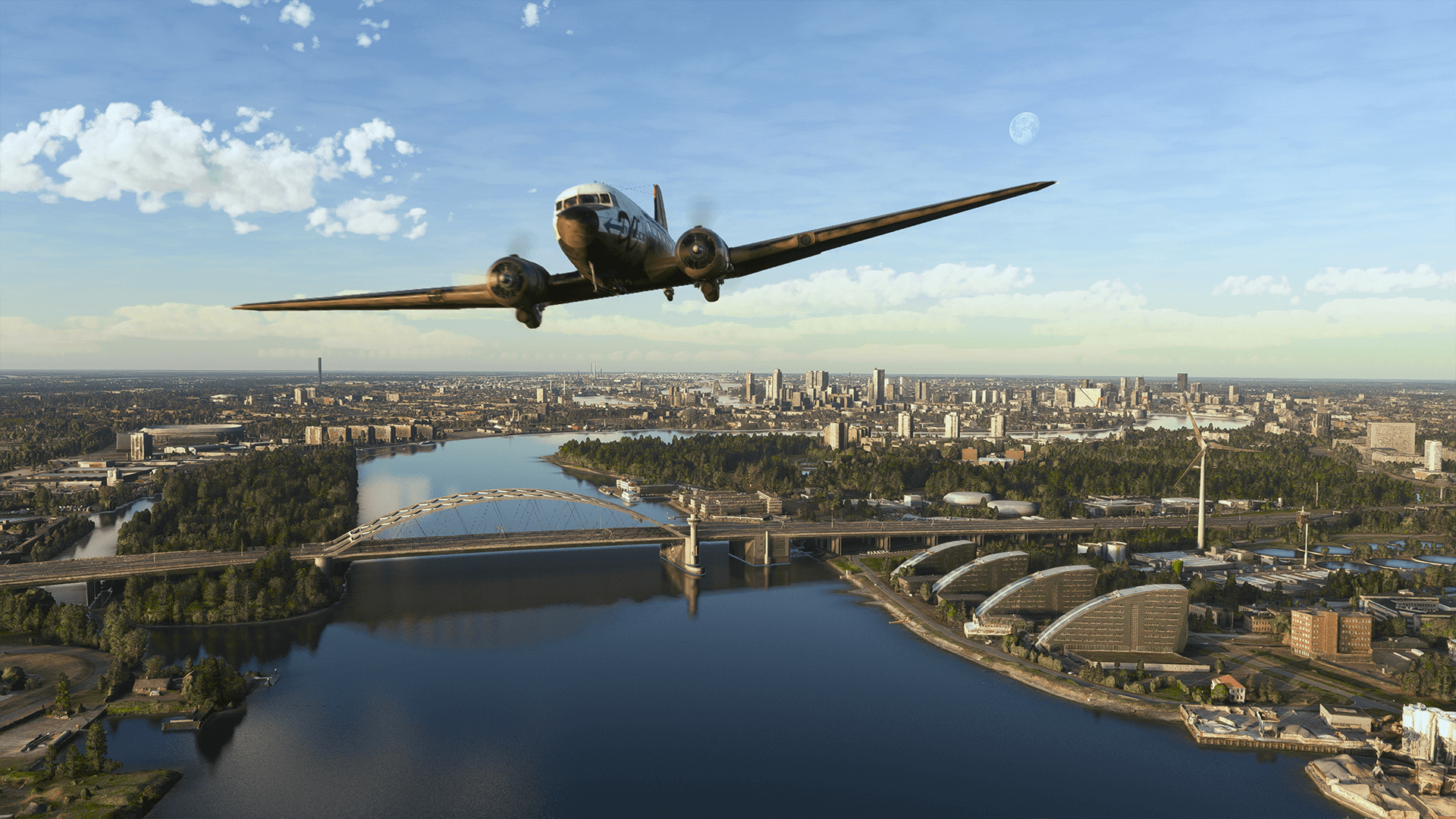
The largest flying boat in history is now available for simmers to fly throughout the globe in Microsoft Flight Simulator!
On July 12, 1929, the dream creation of German aircraft designer Claudius Dornier, the Do X, took off from Lake Constance, just outside of the Swiss town of Altenrhein. Powered by 12 roaring, 610-horsepower V-12 piston engines, the Do X was the largest, heaviest, and most powerful hydroplane ever to take to the sky. It was one of only a small number of flying machines in history to be powered by ten or more engines. By most accounts, the Do X aircraft hosts the largest number of piston engines ever created.
Called a flugschiff (flying ship), Claudius Dornier first conceived of the Do X in 1924, a period in the history of flight when aviation technology was accelerating at a blistering pace and designers strove to create ever larger, faster, and higher-endurance craft. Engineering began on the Do X in September of 1924 with the first set of aircraft drawings. Just under five years later the world’s largest aircraft debuted, a pinnacle of German innovation and engineering. Dornier manufactured three of these during a production run from 1927 to 1932. The airframe operated from 1929 to 1937 in Germany and Italy.
The design consists of a hull with three internal decks and an overall length of 131 feet, 5 inches (40.05 meters), a high main wing with a span of 156 feet, 10 inches (47.8 meters), and sponsons mounted on the lower hull that stabilize the Do X in water and act as complementary wings once aloft.
The lower deck of the aircraft’s hull stored thousands of gallons of fuel. The middle deck had seating for up to 100 people (although when operational, it typically accommodated up to 70). The middle deck also had a lounge with a bar, a dining room, bathrooms, and storage. The upper deck held the crew of up to 14 and all control systems for operating the aircraft, including the cockpit, engine control room, and radio facilities. During one particular flight, a Do X carried 169 people, including passengers and crew, a world record that stood for more than two decades. During its operational tenure, the Dornier Do X drew crowds wherever it went, most notably during a journey from Europe to the United States via Africa and South America.
The Do X was powered by 12 610-horsepower Curtiss V-1570 engines; each V-12 powerplant turned a four-blade, fixed-pitch propeller. The engines were arranged in six pairs, each pair a tractor-pusher configuration in a nacelle mounted above the main wing by a series of braces. The Do X had a range of 1,100 miles (1,770 kilometers) which could be extended with more fuel, housed in both the hull and the wings, cruised at 110 miles per hour (177 kph), and had a top speed of 150 mph (241 kph). The hydroplane typically flew at 1,600 feet (488 meters) above the water, but it could attain an altitude of 10,500 feet (3,200 meters) above sea level when empty of passengers.
The Dornier Do X in Microsoft Flight Simulator was meticulously created using data from historical sources. This historically iconic aircraft performs remarkably well for its size; it can confidently lift into the sky and cross oceans due to its more than 7,200 combined horsepower. Flying it takes a delicate touch, with an outlook to “keep in front of the aircraft” at all times due to its size and the large distances required to maneuver. The Dornier Do X comes with three liveries: Historic, Aviators Club, and Xbox Aviators Club. Purchase it today in Microsoft Flight Simulator for USD $14.99. The sky is calling!
Screenshot gallery
Microsoft Flight Simulator is available for Xbox Series X|S and PC with Xbox Game Pass, PC Game Pass, Windows, and Steam, and on Xbox One and supported mobile phones, tablets, and lower-spec PCs via Xbox Cloud Gaming. For the latest information on Microsoft Flight Simulator, stay tuned to @MSFSOfficial on Twitter.
The largest flying boat in history is now available for simmers to fly throughout the globe in Microsoft Flight Simulator!
On July 12, 1929, the dream creation of German aircraft designer Claudius Dornier, the Do X, took off from Lake Constance, just outside of the Swiss town of Altenrhein. Powered by 12 roaring, 610-horsepower V-12 piston engines, the Do X was the largest, heaviest, and most powerful hydroplane ever to take to the sky. It was one of only a small number of flying machines in history to be powered by ten or more engines. By most accounts, the Do X aircraft hosts the largest number of piston engines ever created.
Called a flugschiff (flying ship), Claudius Dornier first conceived of the Do X in 1924, a period in the history of flight when aviation technology was accelerating at a blistering pace and designers strove to create ever larger, faster, and higher-endurance craft. Engineering began on the Do X in September of 1924 with the first set of aircraft drawings. Just under five years later the world’s largest aircraft debuted, a pinnacle of German innovation and engineering. Dornier manufactured three of these during a production run from 1927 to 1932. The airframe operated from 1929 to 1937 in Germany and Italy.
The design consists of a hull with three internal decks and an overall length of 131 feet, 5 inches (40.05 meters), a high main wing with a span of 156 feet, 10 inches (47.8 meters), and sponsons mounted on the lower hull that stabilize the Do X in water and act as complementary wings once aloft.
The lower deck of the aircraft’s hull stored thousands of gallons of fuel. The middle deck had seating for up to 100 people (although when operational, it typically accommodated up to 70). The middle deck also had a lounge with a bar, a dining room, bathrooms, and storage. The upper deck held the crew of up to 14 and all control systems for operating the aircraft, including the cockpit, engine control room, and radio facilities. During one particular flight, a Do X carried 169 people, including passengers and crew, a world record that stood for more than two decades. During its operational tenure, the Dornier Do X drew crowds wherever it went, most notably during a journey from Europe to the United States via Africa and South America.
The Do X was powered by 12 610-horsepower Curtiss V-1570 engines; each V-12 powerplant turned a four-blade, fixed-pitch propeller. The engines were arranged in six pairs, each pair a tractor-pusher configuration in a nacelle mounted above the main wing by a series of braces. The Do X had a range of 1,100 miles (1,770 kilometers) which could be extended with more fuel, housed in both the hull and the wings, cruised at 110 miles per hour (177 kph), and had a top speed of 150 mph (241 kph). The hydroplane typically flew at 1,600 feet (488 meters) above the water, but it could attain an altitude of 10,500 feet (3,200 meters) above sea level when empty of passengers.
The Dornier Do X in Microsoft Flight Simulator was meticulously created using data from historical sources. This historically iconic aircraft performs remarkably well for its size; it can confidently lift into the sky and cross oceans due to its more than 7,200 combined horsepower. Flying it takes a delicate touch, with an outlook to “keep in front of the aircraft” at all times due to its size and the large distances required to maneuver. The Dornier Do X comes with three liveries: Historic, Aviators Club, and Xbox Aviators Club. Purchase it today in Microsoft Flight Simulator for USD $14.99. The sky is calling!
Screenshot gallery
Microsoft Flight Simulator is available for Xbox Series X|S and PC with Xbox Game Pass, PC Game Pass, Windows, and Steam, and on Xbox One and supported mobile phones, tablets, and lower-spec PCs via Xbox Cloud Gaming. For the latest information on Microsoft Flight Simulator, stay tuned to @MSFSOfficial on Twitter.






